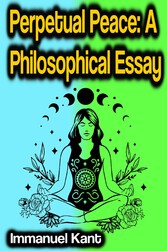Perpetual Peace: A Philosophical Essay
von: Immanuel Kant
Phoemixx Classics Ebooks, 2021
ISBN: 9783986471958
, 133 Seiten
Format: ePUB
Kopierschutz: Wasserzeichen
Preis: 3,49 EUR
eBook anfordern 
Mehr zum Inhalt

Perpetual Peace: A Philosophical Essay
Perpetual Peace: A Philosophical Essay Immanuel Kant - Immanuel Kant was a German philosopher from Königsberg (today Kaliningrad of Russia), researching, lecturing and writing on philosophy and anthropology at the end of the 18th Century Enlightenment.At the time, there were major successes and advances in the sciences (for example, Isaac Newton, Carl Friedrich Gauss, and Robert Boyle) using reason and logic. But this stood in sharp contrast to the scepticism and lack of agreement or progress in empiricist philosophy.Kants magnum opus, the Critique of Pure Reason, aimed to unite reason with experience to move beyond what he took to be failures of traditional philosophy and metaphysics. He hoped to end an age of speculation where objects outside experience were used to support what he saw as futile theories, while opposing the scepticism and idealism of thinkers such as Descartes, Berkeley and Hume.He said that it always remains a scandal of philosophy and universal human reason that the existence of things outside us ... should have to be assumed merely on faith, and that if it occurs to anyone to doubt it, we should be unable to answer him with a satisfactory proof. Kant proposed a Copernican Revolution, saying that 'Up to now it has been assumed that all our cognition must conform to the objects; but ...let us once try whether we do not get farther with the problems of metaphysics by assuming that the objects must conform to our cognition'.Kant published other important works on religion, law, aesthetics, astronomy and history. These included the Critique of Practical Reason (Kritik der praktischen Vernunft, 1788), which deals with ethics, and the Critique of Judgment (Kritik der Urteilskraft, 1790), which looks at aesthetics and teleology. He aimed to resolve disputes between empirical and rationalist approaches. The former asserted that all knowledge comes through experience; the latter maintained that reason and innate ideas were prior. Kant argued that experience is purely subjective without first being processed by pure reason. He also said that using reason without applying it to experience will only lead to theoretical illusions. The free and proper exercise of reason by the individual was both a theme of the Enlightenment, and of Kant's approaches to the various problems of philosophy.His ideas influenced many thinkers in Germany during his lifetime. He settled, and moved philosophy beyond, the debate between the rationalists and empiricists. The philosophers Fichte, Schelling, Hegel and Schopenhauer amended and developed the Kantian system, thus bringing about various forms of German idealism. He is seen as a major figure in the history and development of philosophy. German and European thinking progressed after his time, and his influence still inspires philosophical work today.
Immanuel Kant was an 18th-century philosopher from Königsberg, Prussia (now Kaliningrad, Russia). He's regarded as one of the most influential thinkers of modern Europe & of the late Enlightenment. His most important work is The Critique of Pure Reason, an investigation of reason itself. It encompasses an attack on traditional metaphysics & epistemology, & highlights his own contribution to these areas. Other main works of his maturity are The Critique of Practical Reason, which is about ethics, & The Critique of Judgment, about esthetics & teleology.Pursuing metaphysics involves asking questions about the ultimate nature of reality. Kant suggested that metaphysics can be reformed thru epistemology. He suggested that by understanding the sources & limits of human knowledge we can ask fruitful metaphysical questions. He asked if an object can be known to have certain properties prior to the experience of that object. He concluded that all objects that the mind can think about must conform to its manner of thought. Therefore if the mind can think only in terms of causalitywhich he concluded that it doesthen we can know prior to experiencing them that all objects we experience must either be a cause or an effect. However, it follows from this that it's possible that there are objects of such a nature that the mind cannot think of them, & so the principle of causality, for instance, cannot be applied outside experience: hence we cannot know, for example, whether the world always existed or if it had a cause. So the grand questions of speculative metaphysics are off limits, but the sciences are firmly grounded in laws of the mind. Kant believed himself to be creating a compromise between the empiricists & the rationalists. The empiricists believed that knowledge is acquired thru experience alone, but the rationalists maintained that such knowledge is open to Cartesian doubt and that reason alone provides us with knowledge. Kant argues, however, that using reason without applying it to experience will only lead to illusions, while experience will be purely subjective without first being subsumed under pure reason. Kants thought was very influential in Germany during his lifetime, moving philosophy beyond the debate between the rationalists & empiricists. The philosophers Fichte, Schelling, Hegel and Schopenhauer saw themselves as correcting and expanding Kant's system, thus bringing about various forms of German Idealism. Kant continues to be a major influence on philosophy to this day, influencing both Analytic and Continental philosophy.











